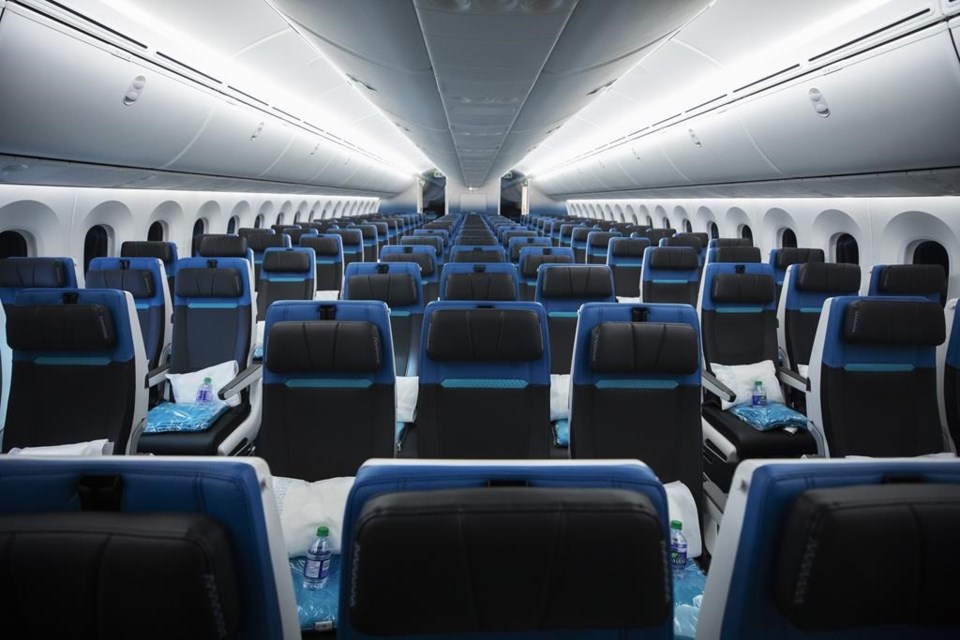TORONTO — As Canadian public health officials question China's transparency in sharing its COVID-19 surveillance information, scientists are stepping up airplane wastewater testing to try to get an early warning of potential new variants.
On Friday, Vancouver International Airport will join Toronto's Pearson International Airport in taking samples of fecal matter that came from airplane toilets to identify what coronavirus variants and subvariants passengers and crew might be bringing into Canada.
"A sentinel system for new variants — that's really where we see the value add of airport testing," Dr. Guillaume Poliquin, vice-president of the Public Health Agency of Canada's National Microbiology Laboratory, told The Canadian Press.
Where will the wastewater testing happen?
The sampling will happen at Canada's two busiest airports: Pearson International in Toronto and Vancouver International Airport.
The Public Health Agency of Canada (PHAC) has actually been working with university scientists to test wastewater from arriving airplanes, as well as terminal buildings, at Pearson since January 2022. The waste from planes coming from both domestic and international destinations has been all mixed together, said Lawrence Goodridge, a University of Guelph professor who is one of the researchers..
That will continue, but PHAC is adding a pilot project to separately test wastewater from airplanes arriving from China or Hong Kong.
On Friday, PHAC and the BC Centre for Disease Control will start testing wastewater from "lavatory dumps" from planes at Vancouver International Airport, regardless of where they came from, said Trevor Boudreau, the airport's director of government relations.
Then in the coming weeks, the researchers will start a pilot study similar to Pearson's toseparately test samples from airplanes coming from China and Hong Kong, Boudreau said.
"The airports really, you know, represent a large proportion of people — many of whom are international travellers coming into the country," Goodridge said.
"The variants that are major public health concerns thus far have all originated outside of Canada. So it's a great way to understand what's coming in and that data then can be used to make public health decisions."
Why are planes from China and Hong Kong getting separate testing?
There has been an explosion of COVID-19 illness after the Chinese government lifted strict restrictions. In a news release issued on Dec. 31, PHAC said China has not provided enough "epidemiological and viral genomic sequence data" on those cases.
That includes information about what variants are circulating and any potential new ones emerging.
"What we're doing here is to take (wastewater testing) one step further and to look to see whether we can get more precision by doing direct airplane sampling," Poliquin said.
"Then we'll be in a position to compare that ... to data from the pooled samples to get a sense of does it truly add significant value, what type of additional information does that give us?"
How does wastewater testing work?
What comes out of the airplane toilets is a "wastewater soup" with strains of virus and variants from hundreds of thousands of people, Goodridge said.
Trucks transport the wastewater to a central facility where scientists take samples.
The first part of the process is to separate the solids and liquids in the waste and remove any "contaminants" — such as fibres and chemicals — that might interfere in the analysis process, said Poliquin.
Then the "clean sample" is run through a process of analyzing the genetic material — specifically RNA from the virus — that's present. That process, called "genomic sequencing," uses computer algorithms to find COVID-19 variants.
Genomic sequencing allows scientists to not only find variants and subvariants they're already familiar with, but also see anything that looks unusual or new.
That's when PHAC can look at any unique mutations and compare them to what they've observed clinically, such as the variants they've found through PCR testing. They can also compare the findings with data they get from other countries about what variants are circulating.
A new Omicron variant that PHAC is watching for now is called XBB.1.5. The Centers for Disease Control and Prevention (CDC) data from the last week of December suggests the variant makes up about 40 per cent of COVID-19 cases in the U.S., and the U.K. is also reporting an increase.
As of Wednesday, the agency was aware of 21 cases of XBB.1.5 in Canada and said it is "currently considered to be only detected sporadically," it said in an email.
Where else is wastewater testing used?
There are more than 175 locations where wastewater testing for COVID-19 happens in Ontario alone, said Rob Delatolla, an environmental engineer at the University of Ottawa. Wastewater testing helps inform public health about how much COVID and what types are spreading in cities and towns, as well as vulnerable neighbourhoods, First Nations and hospitals.
COVID-19 prompted a dramatic increase in wastewater testing, Delatolla said, and it's now also being used to detect influenza and RSV.
Goodridge, from the Pearson Airport wastewater testing project, specializes in food microbiology and used wastewater surveillance to detect food-borne diseases before the COVID-19 pandemic.
Historically, it was also used to detect polio, he said.
Wastewater testing in airports and airplanes has proven invaluable, Goodridge said.
"I would like to see this expanded to (other) major international airports in Canada," he said.
"We're seeing what's coming into the country, you know, in real time."
This report by The Canadian Press was first published Jan. 5, 2023
Canadian Press health coverage receives support through a partnership with the Canadian Medical Association. CP is solely responsible for this content.
Nicole Ireland, The Canadian Press

